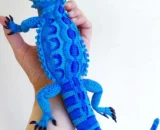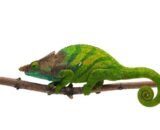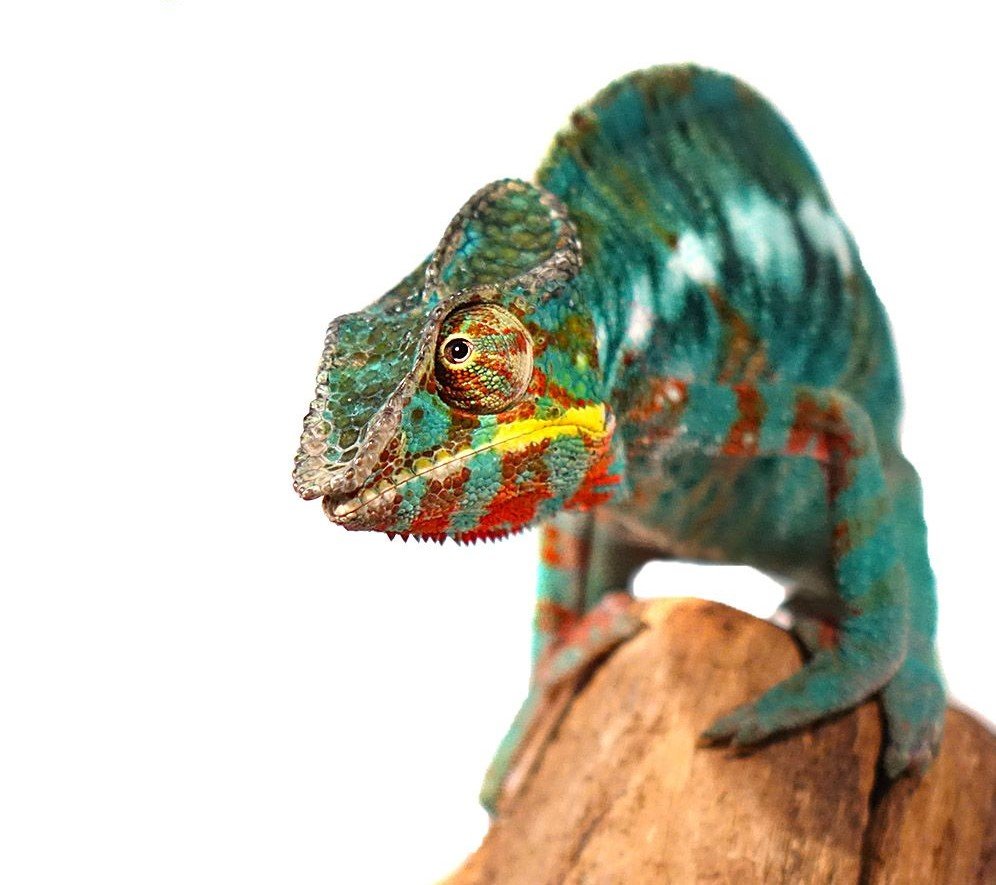baby Bermanja Panther Chameleon, a fascinating and unique reptile that will captivate your heart with its vibrant colors and unique personality.
As they mature, these chameleons will transform into striking adults, with vivid hues of green, yellow, and blue adorning their skin. The Bermanja Panther Chameleon is a unique species, native to Madagascar, and its care requires attention to detail and dedication.
The Bermanja Panther Chameleon is a stunning and unique reptile that is highly sought after by reptile enthusiasts. Known for its striking coloration, this chameleon is named after the region of Bermanja in Madagascar, its native habitat.
The Bermanja Panther Chameleon is a medium-sized chameleon that can grow up to 17 inches in length. The males are larger and more brightly colored than the females, with vibrant shades of red, orange, green, blue, and yellow.
Their colors can change based on their mood, environment, and temperature.
This chameleon is arboreal and requires a large, vertical enclosure with plenty of climbing opportunities. They prefer high humidity levels and temperatures ranging from 70-85°F during the day and dropping to around 65-75°F at night.
The Bermanja Panther Chameleon is an insectivore, and their diet should consist of gut-loaded crickets, mealworms, waxworms, and other insects.
The Bermanja Panther Chameleon can be a bit challenging to care for, and owners should be prepared to provide proper husbandry and veterinary care. It is important to monitor their health and seek medical attention if any issues arise.
Overall, this chameleon is a fascinating and rewarding pet for experienced reptile owners who are dedicated to providing the necessary care and attention.
Physical Characteristics:
Baby Bermanja Panther Chameleons are born with a brown or gray base color and develop their bright green, yellow, and blue hues as they mature. The males tend to be more brightly colored than females, with larger crests and longer tails.
These chameleons can grow up to 20 inches in length, with a tail accounting for more than half of their body length. Their eyes can move independently, allowing them to observe their environment from various angles.
Habitat and Housing:
Baby Bermanja Panther Chameleons require a spacious and well-ventilated enclosure that mimics their natural habitat. A screen enclosure with appropriate branches, vines, and foliage is ideal for these arboreal creatures.
A basking spot with a heat lamp should be provided, along with a UVB light source to mimic natural sunlight. A drip system or misting machine should be used to maintain adequate humidity levels.
Proper habitat and housing are essential for the health and well-being of Bermanja Panther Chameleons. These chameleons require a spacious and well-ventilated enclosure with adequate lighting, heating, and humidity control.
The enclosure should be at least 2 feet wide, 2 feet deep, and 4 feet tall to allow for plenty of room to climb and move around. A screen mesh or wire mesh lid should be used to allow for proper ventilation and to prevent escape.
A basking spot with a temperature range of 85-90°F (29-32°C) and a cooler area with a temperature range of 75-80°F (24-27°C) should be provided. UVB lighting is also necessary for Bermanja Panther Chameleons to properly metabolize calcium and maintain good bone health.
The enclosure should be furnished with climbing branches, vines, and plants to provide hiding spots and stimulation. Live plants such as pothos, hibiscus, and ficus can also help to regulate humidity levels in the enclosure.
It’s important to clean the enclosure regularly and provide fresh water and food daily. A substrate such as a reptile carpet or paper towels can be used for easy cleaning.
Feeding and Nutrition:
Baby Bermanja Panther Chameleons are primarily insectivores and require a varied diet consisting of crickets, mealworms, waxworms, and other feeder insects. These chameleons may also eat small amounts of fruits and vegetables.
Dusting feeder insects with calcium and vitamin D3 supplements is essential for their health and well-being. Bermanja Panther Chameleons are insectivores and require a diet of live insects. Their diet can consist of crickets, roaches, mealworms, waxworms, and hornworms.
It is important to provide a variety of insects to ensure they receive all the necessary nutrients. It is also important to dust their food with a calcium supplement at least once a week, and a multivitamin supplement every other week.
It is recommended to feed juvenile Bermanja Panther Chameleons daily and adults every other day. Their food should be appropriately sized for their age and size. Make sure to remove any uneaten food to prevent it from rotting and contaminating the enclosure.
Bermanja Panther Chameleons require access to clean water at all times. A water dish can be provided, but they are more likely to drink droplets of water off plants or the enclosure walls. It is important to mist the enclosure regularly to maintain humidity and provide them with droplets of water to drink.
It is important to monitor their weight and adjust their feeding schedule accordingly. Obesity can be a concern with captive chameleons, so it is important to provide a balanced and appropriate diet.
Training and Enrichment:
Bermanja Panther Chameleons can be trained to eat from your hand and recognize their owners. However, they are solitary creatures and may not enjoy frequent handling. Providing them with a stimulating environment with branches, vines, and hiding places can help keep them mentally and physically engaged.
Health and Care:
Regular veterinary check-ups are recommended for Bermanja Panther Chameleons to ensure their health and well-being. They are susceptible to various health conditions, including metabolic bone disease and respiratory infections.
Maintaining a clean and hygienic enclosure, providing proper nutrition and lighting, and monitoring temperature and humidity levels are essential for their care.







Customer reviews
Reviews
There are no reviews yet.
Write a customer review